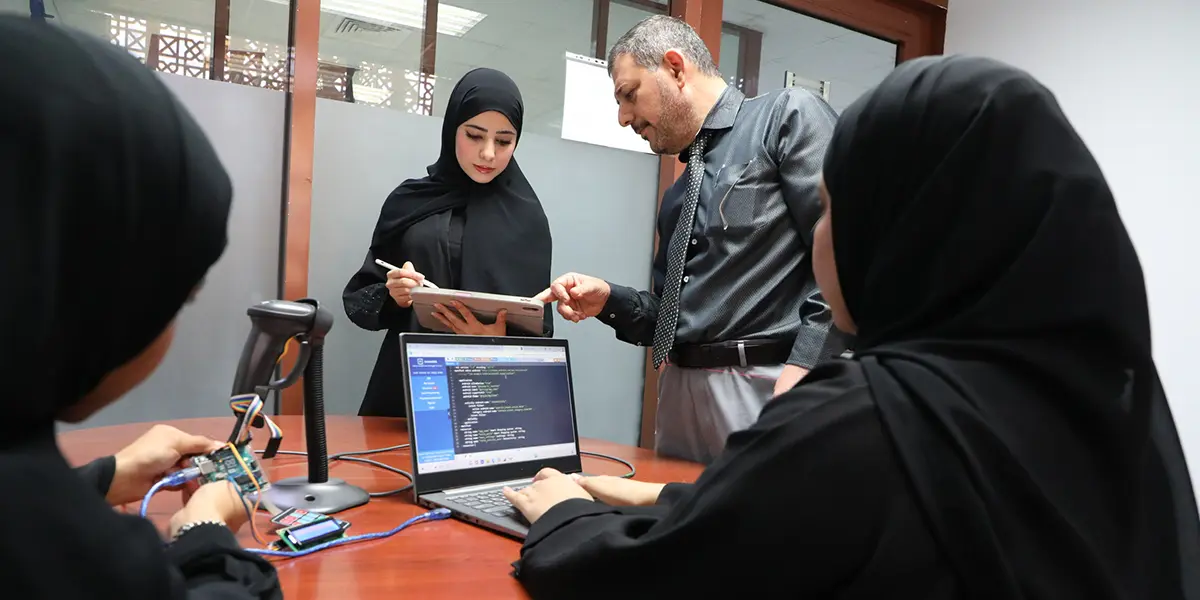A team of students from Sohar University Faculty of Computing and Information Technology has successfully developed a smart shopping cart utilizing Internet of Things (IoT) technology. This project is one of the research initiatives funded by the Ministry of Higher Education, Research and Innovation and is supervised by the University’s Technology Transfer and Incubation Center.
The team consists of Hiba Al-Ma’amari, Athaari Al-Mahrouqi, and Rawan Al-Ma’amari, under the supervision of Professor Jabar Youssef from the Faculty of Computing and Information Technology.
Hiba Al-Ma’amari explained that the project aims to create a smart shopping cart that allows for purchases through a built-in touchscreen equipped with a barcode scanner. The cart identifies the product by scanning the barcode and retrieves information such as the product’s type, name, quantity, and price from a centralized database accessed via Wi-Fi networks.
She added that with this smart cart, consumers can easily manage their shopping lists (adding/removing items), and the system automatically generates and prints the receipt or allows for self-payment via a built-in payment system, enabling customers to leave the store without waiting in long queues. Additionally, the cart helps consumers easily read product prices, check expiration dates, and view stock levels of selected items. It also displays promotional offers and the total cost of items in the cart, helping consumers stay within their budget.
Hiba further emphasized that the smart cart addresses the issue of congestion in large stores, particularly during sales or on weekends, eliminating the need for long waiting times. The smart cart provides a seamless and efficient experience for both customers and retailers, improving service quality, enhancing customer comfort, reducing wait times, and encouraging purchases.
Although there is growing interest in smart shopping carts, Hiba noted that more comprehensive research is needed to evaluate their impact on customer experience and operational efficiency. To address this gap, the team conducted a survey of previous studies to explore the most accurate ways to implement smart carts in real-world retail scenarios and assess their impact on customer satisfaction and shopping quality.
Athari Al-Mahrouqi highlighted that the goals of implementing the smart shopping cart in Oman include exploring its technological capabilities, developing a mobile app to manage and display cart items, improving service quality using IoT technology, automating the billing and self-payment process, accelerating shopping during peak hours, and investigating the impact of smart carts on customer satisfaction.
She also emphasized the academic and scientific significance of the project. Academically, the project provides a rich field for research into customer behavior, the influence of IoT on retail, and the effectiveness of innovative solutions in enhancing the overall shopping experience. It also fosters collaboration across disciplines, including computer science (HCI), business studies (inventory management), engineering (RFID and IoT design), and other academic areas.
Rawan Al-Ma’amari explained the scientific methodology followed in the research project to develop the smart shopping cart. The methodology involved a comprehensive review of previous studies to understand the technical challenges, evaluate user experiences, and assess the overall effectiveness of the smart cart system. Key steps in the research included gathering system requirements, defining the project objectives, identifying stakeholders, understanding key successful features, and exploring different IoT technologies.
The team hopes the idea will be adopted for commercial production, viewing it as a significant opportunity to serve the Omani community and present innovative solutions that contribute to the development of information systems and products benefiting Omani consumers. Furthermore, it aims to open promising career opportunities for recent graduates, enabling them to actively contribute to the growth of Oman’s job market and expand into global markets.
 العربية
العربية

